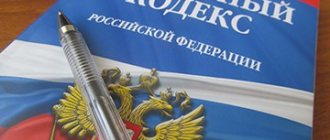Such a concept as close relatives is very often found not only in our everyday life, but also in legislation. The Family, Civil, Housing and even Tax Codes in their interpretations very often define the circle of people who are close relatives. But in practice, our understanding of people related to relatives may diverge from the law. Therefore, it is so important to understand the concept of “close relatives” from the perspective of the Family Code and other legislative provisions in order to clearly answer your questions and be confident in the correct actions when family conflict situations arise.
Who is considered a close relative according to the Russian Family Code?
Article 14 of the RF IC states that close relatives are blood relatives in one generation, across a generation and in neighboring generations. In simple terms, in family law, close relatives are parents, children, grandparents, grandchildren, brothers and sisters (full and half-blood).
It is noteworthy that according to the Family Code, a husband and wife are not close relatives , since they are not related by blood.
Spouses are recognized as family members in accordance with Article 2 of the same Family Code. However, an officially registered marriage, by law, is considered a special type of relationship. Therefore, despite the lack of family ties, husband and wife have some privileges. For example, if one of the spouses died without leaving a will, then the second is the heir of the first priority, like close relatives.
Family relationships
Kinship (kinship) is a connection between people based on the descent of one person from another (direct relationship), or different persons from a common ancestor, as well as on marital family relations.
There are two main types of kinship:
- blood (biological), determined by natural genetic proximity;
- social , which is a system of kinship relations sanctioned by society, in particular, kinship through marriage.
People related by family relations are called relatives (formerly relatives).
Close relatives in other areas of law.
The Family Code is the main legislative act that determines who is a relative. However, in other codes and areas of legislation, the definition of close relatives may include not only those mentioned in the Family Code of the Russian Federation.
For example, according to paragraph 4 of Article 5 of the Code of Criminal Procedure, close relatives of a citizen are his spouse, parents, brothers and sisters, grandparents and grandchildren. Also, close relatives in the Criminal Procedure Code may include adoptive parents and children. That is, in this case, consanguinity does not have the same meaning as for the Family Code.
Article 25.6 of the Code of Administrative Offenses states that close relatives are all those relatives specified in Article 14 of the Family Code, as well as adoptive parents or adopted children.
As for Tax legislation, in which there is a serious need to determine which relatives are close and which are family members (for example, when determining tax benefits), the Tax Code in this matter refers to the Family Code of the Russian Federation.
Do I need to pay tax on an apartment donated by my mother-in-law to my daughter-in-law?
Based on subparagraph 7 of paragraph 1 of Article 228 of the Tax Code of the Russian Federation (hereinafter referred to as the Code), individuals receiving from individuals who are not individual entrepreneurs income in cash and in kind by way of gift, except for the cases provided for in paragraph 18.1 of Article 217 of the Code When such income is not subject to taxation, they independently calculate and pay the amount of personal income tax. In accordance with paragraphs 1 and 2 of clause 18.1 of Article 217 of the Code, income in cash and in kind received by taxpayers from individuals as a gift is not subject to personal income tax, with the exception of cases of donation, including real estate.
Please note => One-time benefit for the birth of a child in 2021
Are adopted children close relatives?
The Family Code does not recognize adoptive parents and those adopted by close relatives for the same reason of lack of consanguinity. However, there is an exception to this rule. For example, if a man marries a woman who has a child and adopts him, that is, the name of this man is recorded in the “father” column on the child’s birth certificate, then they will be considered close relatives to each other. If he remains in the status of a stepfather, then there can be no talk of kinship. Children adopted from an orphanage will not be defined as close relatives.
However, according to Article 137 of the Family Code, despite the lack of kinship with the adoptive parent, adopted children will have all the same personal and property rights and obligations in relation to adoptive parents as natural children.
That is, despite the fact that there is no family connection between the adoptive parents and the children, he will have all the same rights as close relatives.
How does the degree of relationship influence the preparation of a will?
The testator can assign his property to any citizen or legal entity. Freedom of expression is not limited by the degree of relationship between the owner of the property and the applicant for its receipt.
The only condition is that the administrative document should not limit the interests of socially vulnerable citizens.
These include:
- young children;
- disabled spouse;
- disabled parents;
- disabled dependents who are supported by the testator.
Such citizens are entitled to a mandatory share in the inheritance. The will cannot deprive them of this part.
If, when drawing up a document, the rights of the specified persons are not taken into account or they did not exist at the time of its preparation, then such a document can be challenged in court. For example, if at the time of opening the inheritance the heir, who is entitled to an obligatory share, contacts the notary.
Obligatory heirs, including dependents, must prove their relationship with the deceased.
The right is vested in:
- official spouse (common-law and former spouses do not have rights to a compulsory share as spouses);
- official blood and adopted children (children for whom paternity has not been established, adoption has been canceled, wards, stepsons and stepdaughters have the right to claim a share only as dependents);
- disabled parents of the deceased (if they were not deprived of parental rights and the child was not adopted by another family).
Inheritance by close relatives.
One of the main reasons why you may be interested in issues related to family ties is inheritance. When considering this issue, you need to refer to Article 1142 of the Civil Code of Russia. It says that the heirs of the first priority are the children, spouses and parents of the deceased. The heirs of the second stage are the testator's brothers/sisters, as well as grandparents.
Thus, it turns out that spouses, not being close relatives, fall into the category of first-line heirs, while many relatives who are considered close are not direct heirs.
Sources:
RF IC Article 137. Legal consequences of adopting a child
RF IC Article 14. Circumstances preventing marriage
Code of Administrative Offenses of the Russian Federation Article 25.6. Witness
Code of Criminal Procedure of the Russian Federation Article 5. Basic concepts used in this Code
Related Persons
The concept of interdependent persons is given in Articles 20 and 1051 of the Tax Code. Since Article 220 of the Tax Code refers to Article 1051 of the Tax Code, we will proceed from the concept given in this article.
According to Article 1051 of the Tax Code, if the peculiarities of relations between persons may influence the conditions and (or) results of transactions made by these persons, and (or) the economic results of the activities of these persons or the activities of the persons they represent, these persons are recognized as interdependent for tax purposes, to which subparagraph 11 of paragraph 2 of Article 1051 of the Tax Code includes a spouse, a parent (including an adoptive parent), children (including adopted children), full and half brothers and sisters, guardians (trustees) and wards.
As you can see, the Tax Code of the Russian Federation divides all persons who may be interdependent with each other into:
- legal entities;
- individuals.
In this article we will consider only the interdependence of individuals.
Thus, for tax purposes, persons are recognized as interdependent if their relationships may have an impact (clause 1 of Article 1051 of the Tax Code) on:
- conditions and (or) results of transactions made by them;
- economic results of their activities or the activities of the persons they represent.
Subject to these conditions, interdependent persons are (clause 2 of Article 1051 of the Tax Code):
- Individuals when one of them is subordinate to another due to official position (clause 10, clause 2, article 1051 of the Tax Code);
- An individual, his spouse, parents (including adoptive parents), children (including adopted children), full and half brothers and sisters, guardian (trustee) and ward (clause 11, clause 2, article 1051 of the Tax Code) .
Other relatives (as a general rule) are not recognized as interdependent. Thus, are not recognized as interdependent in relation to the taxpayer: parents, grandparents, brothers, sisters (Letters of the Ministry of Finance of Russia dated June 29, 2012 No. 03-04-05/5-801, dated April 3, 2012 No. 03-04 -05/7-428, dated 04/02/2012 No. 03-04-05/9-408, Federal Tax Service of Russia dated 01/17/2013 No. ED-3-3/ [email protected] ), i.e.
A tax deduction can be obtained if:
the husband bought a home from his father-in-law and (or) mother-in-law;
the wife bought an apartment (house, land for individual housing construction) from her father-in-law and (or) mother-in-law;
father-in-law and (or) mother-in-law bought housing from son-in-law;
the father-in-law and (or) mother-in-law bought an apartment (house, land for individual housing construction) from the daughter-in-law.
In the Letter of the Department of Tax and Customs Policy of the Ministry of Finance of Russia dated January 18, 2021 No. 03-04-05/2228, financiers indicated that the following are recognized as interdependent:
- an individual, if their relationship may influence the conditions and (or) results of transactions between them or the economic results of their activities (paragraph 1, clause 1, article 105.1 of the Tax Code);
- individuals recognized as interdependent by the court if the above-mentioned signs exist between them (clause 7 of article 105.1 of the Tax Code of the Russian Federation);
- an individual and his spouse, parents or adoptive parents, children (including adopted children), full and half-siblings, guardian (trustee) and ward (subclause 11, clause 2, article 105.1 of the Tax Code of the Russian Federation).
Determining the interdependence of individuals is of practical importance for obtaining a property tax deduction when purchasing housing (clause 5 of Article 220 of the Tax Code).
Paragraph 5 of Article 220 of the Tax Code states: “Property tax deductions ... are not provided in cases where ... the purchase and sale transaction of a residential building, apartment, room or share(s) in them is made between individuals who are interdependent in accordance with Article 1051 of this Code." According to subparagraph 11 of paragraph 2 of Article 1051 of the Tax Code, interdependent persons are recognized as an individual, his spouse, parents (including adoptive parents), children (including adopted children), full and half-siblings, guardian (trustee) and ward.
By letter dated March 30, 2010 No. 03-04-05/7-145, the Ministry of Finance clarified that the property tax authorities apply to persons who are related and enter into a transaction for the sale and purchase of a residential building, apartment, room or share(s) in them. the deduction was not applied and is not applied.
By letter dated January 31, 2012 No. 03-04-08/9-12, the Russian Ministry of Finance defined a clear list of persons who are classified as interdependent. Based on Art. 1142 – 1145 of the Civil Code of the Russian Federation, relatives in relation to a certain individual (according to the Ministry of Finance) are:
- children, spouse, parents, grandchildren;
- full and half brothers and sisters, grandparents on both the father's and mother's sides, children of full and half brothers and sisters (nephews and nieces);
- full and half brothers and sisters of parents (uncles and aunts), cousins;
- great-grandparents;
- children of his own nephews and nieces (cousins and granddaughters) and siblings of his grandparents (great-uncles and grandmothers);
- children of cousins' grandchildren and granddaughters (great-great-grandsons and great-granddaughters), children of cousins (great-nephews and nieces) and children of great-uncles and grandmothers (great-uncles and aunts);
- stepsons, stepdaughters, stepfather, stepmother.
In addition, persons recognized as being in relationships of kinship or affinity are listed in section 11 “Kinship, affinity” of the All-Russian Classifier of Information on the Population. OK 018-95", approved by Decree of the State Standard of the Russian Federation dated July 31, 1995 N 412.
Paragraph 5 of Article 220 of the Tax Code refers only to the purchase and sale agreement, which means that if housing is acquired through other transactions, then, according to the Ministry of Finance of Russia and the Federal Tax Service of Russia, a deduction can be obtained even if the parties to the transactions are interdependent. Such explanations were given by officials regarding the assignment of rights and obligations under transactions (changes of persons in an obligation), which are the basis for the purchase of housing. In particular, similar clarifications were provided in relation to the agreement on raising funds for construction and the preliminary agreement for the purchase and sale of housing (Letters of the Ministry of Finance of Russia dated 03/07/2013 N 03-04-05/4-194, dated 12/12/2012 N 03-04- 05/4-1390, Federal Tax Service of Russia dated 02.11.2012 N ED-3-3/ [email protected] ).
Non-state pension provision
In the mentioned Federal Law of November 29, 2007 N 284-FZ “On Amendments to Part Two of the Tax Code of the Russian Federation” (hereinafter referred to as Federal Law N 284-FZ) a new edition of paragraph was adopted. 19 (26 as amended, effective from 01/01/2010) paragraphs. 2 p. 1 art. 220 of the Code, according to which, in particular, when determining the interdependence of persons, reference to paragraph 2 of Art. 20 of the Code.
At the same time, in paragraph 1 of Art. 20 of the Code defines a list of persons recognized for tax purposes as interdependent persons, the relationships between whom may influence the conditions or economic results of their activities. In particular, such persons include persons who, in accordance with the family legislation of the Russian Federation, are in relationships of kinship or affinity (clause 3, clause 1, article 20 of the Code).
Inheritance by right of representation
In separately provided cases, the share of an heir by law who died before the opening of the inheritance or at the same time as the testator passes by right of representation to his corresponding descendants and is divided equally between them.
The descendants of an heir by law who was deprived of the inheritance by the testator shall not inherit by right of representation, if this is indicated in the will.
The descendants of the deceased before the opening of the inheritance or simultaneously with the testator of the heir, who could be excluded from inheritance on the grounds specified in the legislation, may be excluded by the court from inheritance by right of representation if the court considers their calling to inherit contrary to the principles of morality.
What is an escheated inheritance?
Rarely, but it still happens that the deceased has no relatives left, or they are considered unworthy, and then all his property must become the property of the state.
However, such cases are so rare, because the order of inheritance can be traced to the 8th step , and there will always be at least some distant relatives.
How are immediate family members different from other family members?
It is possible to determine the differences between family members and close relatives only when certain legal relations arise, since some provisions of the law may indicate different citizens as family members .
Thus, based on the norms of family law, when alimony obligations arise, it becomes obvious that spouses and close relatives are generalized and indicated as family members . In another case, according to the norms of housing legislation, family members include only spouses , parents and children (Art.
31 Housing Code of the Russian Federation). However, this article indicates the possibility of recognizing third parties as in court.
Based on the norms of civil law , we can conclude that not all family members are considered close relatives, since there is no indication of spouses . However, in another case, some relatives may be part of the family.
How to share everything that happened before the wedding
In addition, property acquired before the wedding or received as an inheritance is not divided equally, that is, the obligatory share of the spouse is not allocated from it. This property will be divided in equal parts among all heirs in line.
For example, a spouse left a car and an apartment after his death. He inherited the apartment from his relatives, and purchased the car while married. All this will be divided like this: the apartment will be divided in equal shares among all first-priority relatives, and the car will first be allocated the marital 1/2 share , and the remaining 1/2 will be divided among all the heirs, namely the wife and children.
Another nuance, after the death of one of the spouses, the second. He can register his spousal part in his name immediately after death and not wait six months to open an inheritance. But the second half of the property will be distributed among the heirs only after 6 months from the date of death of the testator.
Rubric “Question/Answer”
Good afternoon Is my stepfather a close relative if he was legally married to my mother for more than 30 years? Now he is dead. I work in a government agency.
Can I receive financial assistance in connection with his death? The organization’s wage regulations state that financial assistance is paid in connection with the death of a close relative. Thank you!
If my brother and I have the same father, but different mothers, can we legally be considered close relatives?
My father, with whom my brother and I did not communicate, died. The mother has been dead for a long time. The father lived with another woman and left a will after his death. He bequeathed all his property to her. Can my brother and I get a share as close relatives?
Detailed answers about who is considered close relatives:
- Due to frequent changes in legislation, information sometimes becomes outdated faster than we can update it on the website.
- All cases are very individual and depend on many factors. Basic information does not guarantee a solution to your specific problems.
That's why FREE expert consultants work for you around the clock!
- via the form (below), or via online chat
- Call the hotline:
Content:
In Russian law, the concept of “close relatives” is found quite often. However, depending on whether it is indicated in the family code, the code of administrative offenses or criminal law, this term has different definitions.
Knowing who a close relative is is important, especially when it comes to inheritance issues. If you encounter difficulties in obtaining an inheritance, it is better to seek help from professionals.
Proof of relationship when inheriting property
When accepting an inheritance, according to the law, it is necessary to confirm to the notary the family relationship with the heir. Depending on the order of inheritance and the distance of relationship, these may be the following documents:
- birth certificate - in case of death of a parent;
- certificate of recognition of paternity - if the child was born outside of an official marriage;
- adoption decision;
- marriage certificate.
Depending on the order of inheritance and the distance of relationship, it will be necessary to provide a more extensive list of documents. If it is not possible to confirm the relationship, the relative can contact the registry office to request the necessary data.
If the registry office for some reason cannot provide such information, then the citizen has the right to go to court to recognize family ties.








